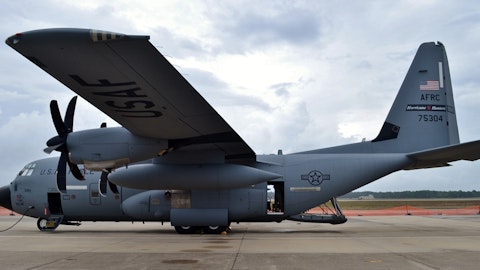John Plueger: Yes, let me just add to that Korea where we will start delivering — May will be our first of 10 new Boeing 787-10s going to Korean airlines.
Stephen Trent: Very helpful. I appreciate the time, gentlemen. Thank you.
Operator: And we will take our final question from Ron Epstein with Bank of America. Your line is open.
Ronald Epstein: Hey, good morning.
John Plueger: Hi, Ron.
Ronald Epstein: Good evening, I guess. Not morning anymore. Yes, so just getting back to this supply-demand shortage situation, Steve saying all these airplanes are delivered late and so on and so forth. That kind of begs the question, do you think there’s room for a valid third player now? I mean, it just seems like if there was another company making airplanes right now, things wouldn’t be late. Like making big airplanes, I should say.
Steven Hazy: Yes, but Ron, those manufacturers have to deal with the same supply chain, the same engine guys, the same companies that make avionics, the same companies that make hydraulic pumps, the same companies that make galleys and seats. So yes, if someone wants to build a new generation aircraft, we certainly will evaluate those products. But they’re also going to be faced with the same supply chain issues that are faced not only on the commercial side by Boeing, Airbus and Embraer, but also by our military contractors where you’ve seen an uptick in military aerospace and aircraft demand worldwide.
Ronald Epstein: But I guess what I’m getting at, Steve, is it’s kind of like not every airplane company is getting mired down in FAA audits and FAA investigations seemingly on a monthly basis, right? So I don’t know.
Steven Hazy: Yes, but Airbus has really been late as well. In fact, I can just give you some small examples. I was looking at this over the weekend. So I went back to the summer of 2023, and I said, how many aircrafts that we thought at that time would deliver in Q1 of 2024 did not deliver? So we actually had 14 actual deliveries that took place, and we had 12 aircraft that I thought nine months ago would deliver, did not deliver. They include, for example, an Airbus A350-900 that was supposed to deliver in March, and we have it on lease, contract to Air France, and it now will deliver in July. So it was a plane that was supposed to deliver in Q1. It will now deliver in Q3. We have four 787s that were supposed to deliver to four different airlines in Q1.
This is nine months ago. That was the outlook. None of them delivered. We have A321neos that didn’t deliver in Q1 that slipped into Q2. Same thing with A330neos. We have A220s that were late. We have four 737s that should have delivered in Q1 that will now deliver in Q2 and Q3. So it’s not a Boeing SAA regulatory issue. It’s an industry-wide phenomenon, Ron.
John Plueger: Ron, this is John. Let me just add one other comment. The two most important words in your question is when you said another airplane that could be delivering right away. There is no right away. So any new manufacturer, and you’re probably hinting at Embraer, as it was reported this past week, they’re looking at doing something like this. But any new manufacturer, I mean, it’s going to take years, Ron, for the certification and delivery of new aircraft because any new aircraft will be subject to the heightened regulatory scrutiny we’re seeing today, both from the FAA and EASA. So the real key question, even if it happens, is it’s going to take some time, Ron. It’s going to take a fair amount of time. This is not even a two to three-year thing.
This is a well beyond 2030, I think, timescale, if at all. So not trying to cuckoo it, just trying to put a little reality on it for the supply chain factor Steve commented on, but just the reality of the time it takes to develop and certify a new aircraft, even if you’re not plagued with current production or supply chain challenges or regulatory oversight problems, this is a formidable opportunity. And the other thing, Ron, is you’re very knowledgeable about aircraft and OEMs and issues. Any new product, whether it’s going to come out from Boeing or Airbus or China or Brazil or some super wealthy investor that thinks this is the future, is going to require a new engine. I don’t see any new aircraft that are breakthrough improvements in economics and operating efficiency will have current generation engines.
So when do you think the first new technology engine will be certified and available to power such a new airframe? And I agree with John, we’re probably looking at 2030 or beyond.
Ronald Epstein: Interesting. And then maybe changing gears to a more simple question. How’s the reaction been to the A350 freighter, given you guys are launching it?




